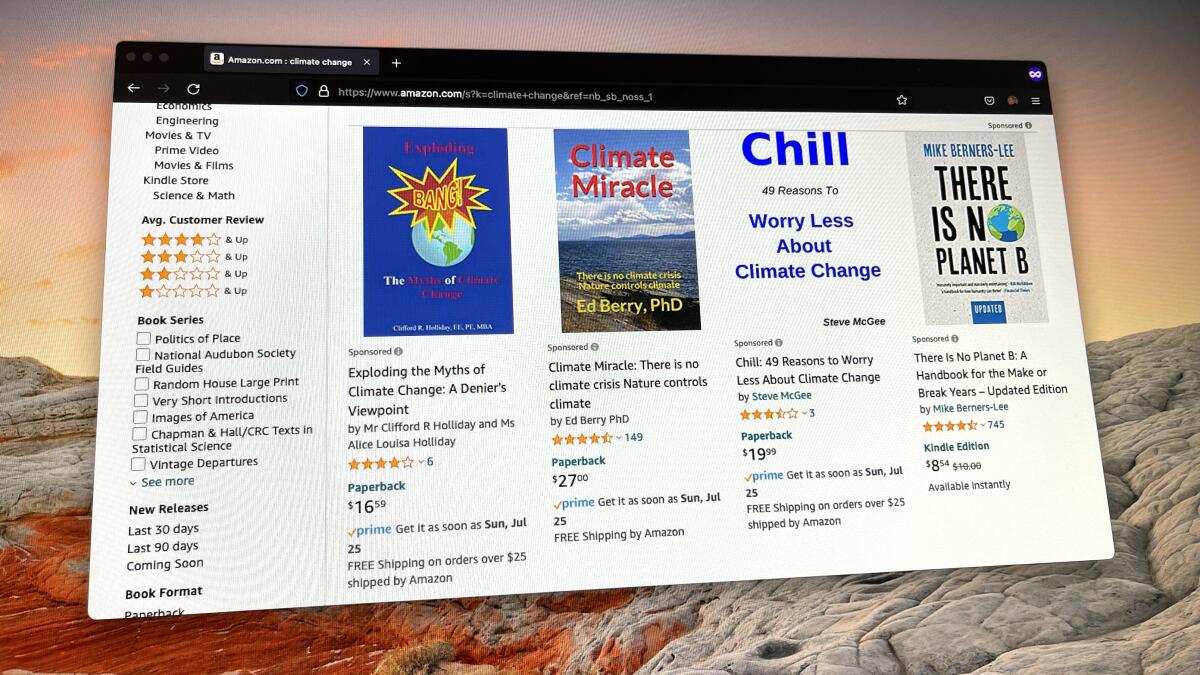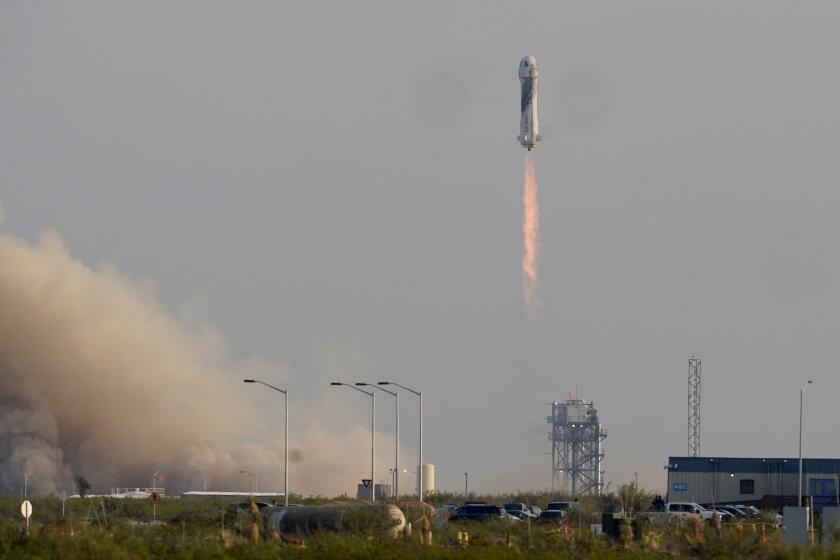As Jeff Bezos stresses climate change, Amazon promotes books saying it’s fake

- Share via
Soon after Jeff Bezos returned from the edge of space, the billionaire-turned-astronaut delivered a warning to everyone he’d briefly left behind on Earth.
“We live on this beautiful planet,” Amazon.com Inc.’s founder — and, until recently, chief executive — said Tuesday. “When you get up there and you see it, you see how tiny it is and how fragile it is.”
“We need to take all heavy industry, all polluting industry, and move it into space,” he added, “and keep Earth as this beautiful gem of a planet that it is.”
It’s a familiar sentiment from the world’s richest man, who’s made environmentalism a central part of his public image. At an Amazon summit last year, he said people who deny the reality of human-caused climate change are “not being reasonable.”
Yet on the e-commerce platform he built, a very different message is being sold — and getting boosted by the company’s own algorithms.
New research from the nonprofit investigative group Advance Democracy has revealed that Amazon.com’s main search function — the “Sort by: Featured” display option, which is the default way Amazon filters its enormous catalog of products when customers go looking for something — gives prominent real estate to books that downplay or outright deny the reality of climate change.
Advance Democracy found that 20% of the top 60 search results for “climate change” returned products containing “misinformation about climate change,” including three of the first four sponsored results in the main product list.
The nonprofit also found advertisements for climate-denialist books on the product pages of more scientifically sound climate texts. For instance, the “products related to this item” list underneath Bill Gates’ “How to Avoid a Climate Disaster” included a sponsored link to “Exploding the Myths of Climate Change: A Denier’s Viewpoint.” Under Mike Berners-Lee’s “There Is No Planet B” was an ad for “Climate Miracle: There is no climate crisis, Nature controls climate.”
Following Virgin Galactic founder Richard Branson to the edge of space, Amazon.com billionaire Jeff Bezos ushered in the era of lower-cost commercial spaceflight -- or so many scientists and would-be astro-tourists hope.
The Times independently confirmed that climate denialist books appear among the top Amazon results for generic searches such as “climate,” “climate change” and “global warming,” as well as on the product pages of mainstream climatological texts.
Advance Democracy said it conducted its research while using a virtual private network and not logged into an Amazon account, in an attempt to ensure that the algorithm’s recommendations wouldn’t be customized based on who was doing the research. Amazon says it displays sponsored products based on their relevance to a user’s search.
Advance Democracy’s findings show “that climate change misinformation is prevalent, and even being promoted, on e-commerce sites,” Daniel Jones, the organization’s president, told The Times in a written statement. “Just this week, Amazon released a press release ‘encouraging more companies to take action on climate change,’ while at the same time the platform is profiting [from] and promoting climate change denialism on its platform.”
Jones — a former Senate staffer who rose to national prominence for his investigation of the CIA’s use of torture during the war on terror, as portrayed by Adam Driver in the 2019 film “The Report” — added that “the fact that if you search ‘climate’ … climate misinformation immediately comes up is outrageous.”
In response to Advance Democracy’s concerns, an Amazon spokesperson said the e-commerce giant is “committed to providing a positive experience for our customers” and that “similar to other stores that sell books, we provide our customers with access to a variety of viewpoints.”
“Our shopping and discovery tools are not designed to generate results oriented to a specific point of view,” the spokesperson said in an email, adding that “featured” results are chosen based on a variety of factors, including customer behavior, product information and item availability.
This is a familiar refrain for the company. Facing accusations that its algorithm prioritized Amazon Basics products over alternative third-party options, Amazon told the Atlantic, “We feature the products customers will want.”
But the idea that algorithms are neutral, impartial tools is a contested one. Over the last few years, more and more critics have warned that the computer systems helping to filter our news, screen our employees and sentence our criminals may be rife with unseen biases. Content-ranking algorithms of the sort used to curate social media feeds favor content that elicits a strong emotional response, including conspiracy theories, research has shown.
Amazon has previously come under fire for pushing readers who searched “vaccine” toward anti-vaccine literature — and it isn’t alone. YouTube has found itself in hot water for algorithmically promoting climate change misinformation, and Advance Democracy has made similar criticisms of EBay as it does Amazon. “14% of eBay’s top search results for ‘climate change’ are for products containing misleading information about climate change,” such as the book “Climate Bogeyman: The Criminal Insanity of Warming / Climate Change Hoax,” the organization wrote.
Amazon and Bezos both have a mixed history when it comes to environmentalism.
In February 2020, Bezos committed to spending $10 billion on the fight against climate change; he has since set 2030 as the deadline for dispensing all of that money.
Meanwhile, Amazon has committed to becoming carbon neutral by 2040, worked to transition its delivery fleet away from fossil fuels and co-founded a “Climate Pledge” that encourages companies to decarbonize their work and regularly report their greenhouse gas emissions. The company accounts for an estimated 40% of all American e-commerce.
But those efforts stand in contrast to both Amazon’s environmental impact — its carbon footprint grew 19% in 2020 — and its actions, including firing two employees who were leading an “Amazon Employees for Climate Justice” group, providing cloud computing services to fossil fuel companies and donating to political candidates who have questioned or downplayed the threat of climate change.
Amazon’s algorithmic promotion of books that muddy the waters of the climate crisis is another strand in that web of contradictions.
“Algorithms are killing the climate,” said Jamie Henn, the director of the climate advocacy groups Fossil Free Media and Clean Creatives.
“The impact that Amazon has on society isn’t just in its factories and trucks driving around our neighborhoods,” Henn added. “It’s in the way that it shapes or warps the way people see the world.”
For Amazon users, that could mean seeing a version of the world at odds with what climate scientists — and Jeff Bezos himself — agree is actually happening.








